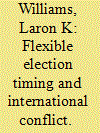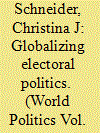| Srl | Item |
| 1 |
ID:
123617


|
|
|
|
|
| Publication |
2013.
|
| Summary/Abstract |
While there are a large number of studies examining the differences in conflict behavior due to varying institutional arrangements, scholars have not effectively addressed the differences in electoral cycles between systems with fixed versus flexible election timing. At the same time that parliamentary regimes give the Prime Minister the power to dissolve parliament, they give the parliament the power to remove the government with a vote of no-confidence. Together, these institutional attributes make the precise timing of the elections-and thus the public's opportunity to hold the government accountable-largely uncertain. I develop a theory that expectations of an upcoming election constrain the foreign policy decision making of executives, and induce pacific behavior. I estimate the probability of an election in a sample of 17 advanced parliamentary democracies from the 1950s to 2001. I find convincing support for my theory, as the probability of hostile dispute initiation is a function of those characteristics that influence the timing of elections, including majority support and the electoral cycle. More specifically, majority and minority governments face varying incentives to initiate disputes because of the different risks of an immediate election.
|
|
|
|
|
|
|
|
|
|
|
|
|
|
|
|
| 2 |
ID:
121908


|
|
|
|
|
| Publication |
2013.
|
| Summary/Abstract |
This article analyzes electoral cycles in distributional bargaining in the European Union. The author argues that governments attempt to increase their EU membership benefits above average levels in the preelection period, hoping to appear politically competent to voters. The theory discusses when and how EU members can increase these gains before elections through negotiations in the Council of Ministers. A time-series cross-sectional analysis of EU member states' annual budget negotiations from 1977 to 2006 supports the existence of conditional electoral cycles in distributional bargaining and generally points to the importance of accounting for such cycles when analyzing patterns of international cooperation.
|
|
|
|
|
|
|
|
|
|
|
|
|
|
|
|
| 3 |
ID:
186566


|
|
|
|
|
| Summary/Abstract |
Anti-corruption efforts are inherently political. Corruption charges can be levied against political opponents as an instrument of repression; they can also be used against troublesome allies in the same party coalition to further consolidate power. In this paper, we focus on Indonesia and ask: Do major corruption charges follow a presidential electoral cycle—and if so, how? We contend charges against prominent members of the government coalition are more likely to happen before an election, allowing the government to replace intra-party rivals with loyal allies. Conversely, charges against prominent opposition members are more likely to happen after an election when fears of retaliation are low, opportunities for credit-claiming are high, and there is an incentive to remove veto players who may inhibit implementing the government's agenda. To test this argument, we use an original, newly assembled dataset of all major corruption charges—i.e., those involving high-profile politicians and garnering international attention—in Indonesia from 1998–2015 as reported in the Associated Press. We find a significant and robust relationship between the electoral calendar and major corruption charges. This relationship is robust across presidential administrations. These results yield insights into how anti-corruption efforts can become a political tool and counsel caution about the effectiveness of “good governance,” especially in new democracies. Finally, we discuss how contextual political factors external to Indonesia's anti-corruption commission, reinforce this empirical pattern.
|
|
|
|
|
|
|
|
|
|
|
|
|
|
|
|